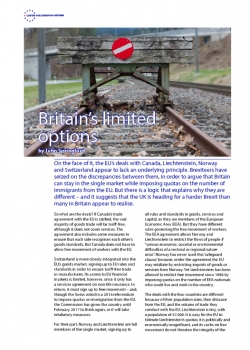
Britain's limited options
On the face of it, the EU’s deals with Canada, Liechtenstein, Norway and Switzerland appear to lack an underlying principle. Brexiteers have seized on the discrepancies between them, in order to argue that Britain can stay in the single market while imposing quotas on the number of immigrants from the EU. But there is a logic that explains why they are different – and it suggests that the UK is heading for a harder Brexit than many in Britain appear to realise.
So what are the deals? If Canada’s trade agreement with the EU is ratified, the vast majority of goods trade will be tariff-free, although it does not cover services. The agreement also includes some measures to ensure that each side recognises each other’s goods standards. But Canada does not have to allow free movement of workers with the EU.
Switzerland is more closely integrated into the EU’s goods market, signing up to EU rules and standards in order to ensure tariff-free trade in manufactures. Its access to EU financial markets is limited, however, since it only has a services agreement on non-life insurance. In return, it must sign up to free movement – and, though the Swiss voted in a 2014 referendum to impose quotas on immigration from the EU, the Commission has given the country until February 2017 to think again, or it will take retaliatory measures.
For their part, Norway and Liechtenstein are full members of the single market, signing up to all rules and standards in goods, services and capital, as they are members of the European Economic Area (EEA). But they have different rules governing the free movement of workers. The EEA agreement allows Norway and Liechtenstein to restrict the flows of people if "serious economic, societal or environmental difficulties of a sectoral or regional nature arise". Norway has never used this ‘safeguard clause’, because, under the agreement, the EU may retaliate by restricting imports of goods or services from Norway. Yet Liechtenstein has been allowed to restrict free movement since 1998 by imposing quotas on the number of EEA nationals who could live and work in the country.
EU may tolerate Liechtensteins #freemovement restrictions but would not allow Britain to follow suit
The deals with the four countries are different because of their population sizes, their distance from the EU, and the volume of trade they conduct with the EU. Liechtenstein is tiny, with a population of 37,000. It is easy for the EU to tolerate Liechtenstein’s quotas: it is politically and economically insignificant, and its curbs on free movement do not threaten the integrity of the EU. Canada only sells 8 per cent of its exports to the EU, is on the other side of the Atlantic, and it will never be an EU member, for obvious reasons, unlike the other three countries. Thus the EU has been willing to grant limited market access without free movement strings attached. But 74 per cent of Norway’s exports, and 58 per cent of Switzerland’s, go to the EU. They are therefore forced by the EU to accept largely unfettered migration flows.
What does this mean for Britain’s forthcoming negotiation? Influential Conservatives hope that the EU will agree to limited curbs to free movement in exchange for small restrictions to UK services exports to the EU. Rupert Harrison, an advisor to former Chancellor George Osborne, has floated the idea of an ‘EEA minus’, with "a bit more immigration control and a bit less single market". The British press seized on remarks by the head of France’s central bank, François Villeroy de Galhau, who said that UK banks could lose their "passporting" rights if Britain does not sign up to EU rules, including free movement. (Passporting means that banks headquartered in the UK can set up branches elsewhere in the EU, and be regulated and supervised by the British authorities.) The British press assumed that Villeroy de Galhau was suggesting that only a small price, limited to the financial sector, would need to be paid if the UK insisted on restricting free movement.
Yet the EU’s relationships with these four countries do not suggest that the bloc will accept such a small price. The UK buys 17 per cent of the EU’s exports (excluding trade within the club), while the EU receives 44 per cent of the UK’s. Britain is also leaving the EU; by contrast, when the political elites in Norway, Liechtenstein and Switzerland negotiated their agreements with the EU, they hoped to join the union one day. The UK’s tight economic integration with the EU suggests that even tariff-free access to EU goods markets may be hard to negotiate if Britain does not sign up to free movement and EU regulations. That, after all, is what Switzerland has been forced to accept.
For their part, Britain’s politicians would find it difficult to accept only minor curbs to free movement – such as the right to stop people moving to the UK unless they have a job offer. Between 2014 and the referendum, Britons told pollsters that the number one issue facing the country was immigration. And the Leave campaign pulled ahead in the polls in the run-up to the vote, when they shifted their focus onto immigration from the economy. Britain’s new prime minister, Theresa May, has said that the UK "must regain more control of the numbers of people who come here from Europe", limiting her wiggle room – and the only way to significantly reduce the numbers is to impose quotas, which the EU might tolerate in the case of Liechtenstein, but not Britain.
This suggests that the UK will have to put all of its diplomatic effort into a two-pronged strategy: maximising market access in goods, and ensuring that there is no damaging hiatus between leaving the EU and the start of the bespoke trade agreement.
For a tariff-free goods trade agreement without free movement, the UK could agree to match the EU’s goods market regulations. But such an agreement would severely curtail UK services companies’ right to operate in the EU. This does not mean simply giving up the EU banking passport; the UK might have to swallow restrictions on public procurement, airlines, tourism and other services. The UK has a stronger comparative advantage in services than any other medium-sized country: over 40 per cent of its exports are in services. So such a deal would be a serious blow.
Article 50 of the Treaty on European Union gives the EU and Britain two years to negotiate a withdrawal treaty, a deadline that may only be extended by unanimity. The agreement on the future relationship would ideally be negotiated in parallel (though the Commission has so far said that it should be negotiated only after the UK has left the EU), but is likely to take longer and may have to be ratified by all 27 remaining states. The UK could therefore fall out of the single market before a long term deal is done, causing severe disruption to UK trade with the EU. Goods exporters would face tariffs, and services exporters would face the same legal barriers to sales in EU member-states as any other country outside the EU.
Norway, Switzerland & Canada options tell you one thing: Britain has limited options #Brexit
So the second prong of the UK’s strategy must be to try to convince the EU to give enough time for a comprehensive agreement to be negotiated, perhaps by being a member of the EEA until the trade deal is agreed. But, if there is one thing that the Norwegian, Swiss and Canadian 'options' tell you, it is that Britain does not have a lot of options.
John Springford is a senior research fellow at the Centre for European Reform.


Comments